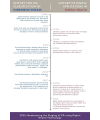Modernizing the Staging of Parkinson Disease Using Digital Health Technology
- PMID: 40184612
- PMCID: PMC12008700
- DOI: 10.2196/63105
Modernizing the Staging of Parkinson Disease Using Digital Health Technology
Abstract
Due to the complicated nature of Parkinson disease (PD), a number of subjective considerations (eg, staging schemes, clinical assessment tools, or questionnaires) on how best to assess clinical deficits and monitor clinical progression have been published; however, none of these considerations include a comprehensive, objective assessment of all functional areas of neurocognition affected by PD (eg, motor, memory, speech, language, executive function, autonomic function, sensory function, behavior, and sleep). This paper highlights the increasing use of digital health technology (eg, smartphones, tablets, and wearable devices) for the classification, staging, and monitoring of PD. Furthermore, this Viewpoint proposes a foundation for a new staging schema that builds from multiple clinically implemented scales (eg, Hoehn and Yahr Scale and Berg Balance Scale) for ease and homogeneity, while also implementing digital health technology to expand current staging protocols. This proposed staging system foundation aims to provide an objective, symptom-specific assessment of all functional areas of neurocognition via inherent device capabilities (eg, device sensors and human-device interactions). As individuals with PD may manifest different symptoms at different times across the spectrum of neurocognition, the modernization of assessments that include objective, symptom-specific monitoring is imperative for providing personalized medicine and maintaining individual quality of life.
Keywords: AI; Parkinson disease; artificial intelligence; digital health; disease classification; neurocognition; personalized medicine; wearables.
©John Michael Templeton, Christian Poellabauer, Sandra Schneider, Morteza Rahimi, Taofeek Braimoh, Fhaheem Tadamarry, Jason Margolesky, Shanna Burke, Zeina Al Masry. Originally published in the Journal of Medical Internet Research (https://www.jmir.org), 04.04.2025.
Conflict of interest statement
Conflicts of Interest: None declared.
Figures




References
-
- Dorsey ER, Bloem BR. The Parkinson pandemic-a call to action. JAMA Neurol. 2018 Jan 01;75(1):9–10. doi: 10.1001/jamaneurol.2017.3299. https://jamanetwork.com/journals/jamaneurology/fullarticle/2661302 2661302 - DOI - PubMed
-
- Templeton JM, Poellabauer C, Schneider S. Enhancement of neurocognitive assessments using smartphone capabilities: systematic review. JMIR Mhealth Uhealth. 2020 Jun 24;8(6):e15517. doi: 10.2196/15517. https://mhealth.jmir.org/2020/6/e15517/ v8i6e15517 - DOI - PMC - PubMed
-
- Blake-Krebs B, Herman L. When Parkinson's Strike Early: Voices Choices Resources and Treatment. New York, NY: Hunter House Inc; 2001.
-
- Laganas C, Iakovakis D, Hadjidimitriou S, Charisis V, Dias SB, Bostantzopoulou S, Katsarou Z, Klingelhoefer L, Reichmann H, Trivedi D, Chaudhuri KR, Hadjileontiadis LJ. Parkinson’s disease detection based on running speech data from phone calls. IEEE Trans Biomed Eng. 2022 May;69(5):1573–1584. doi: 10.1109/TBME.2021.3116935. - DOI - PubMed
-
- Yang W, Hamilton JL, Kopil C, Beck JC, Tanner CM, Albin RL, Ray Dorsey E, Dahodwala N, Cintina I, Hogan P, Thompson T. Current and projected future economic burden of Parkinson's disease in the U.S. NPJ Parkinsons Dis. 2020 Jul 09;6(1):15. doi: 10.1038/s41531-020-0117-1. https://doi.org/10.1038/s41531-020-0117-1 117 - DOI - DOI - PMC - PubMed
MeSH terms
LinkOut - more resources
Full Text Sources
Medical
Research Materials

